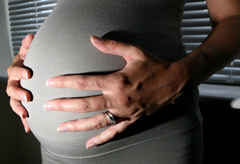Pregnancy not linked to 'baby brain' memory loss
A new study by an Australian university has found that pregnancy does not affect the memory.

A new study by an Australian university has found that pregnancy does not affect the memory.
'Baby-brain', 'preg-head' or 'porridge-brain': all names for those irritating lapses in memory and concentration that lots of new mums and pregnant women suffer.
But now a new study has said that pregnant women should be encouraged to stop blaming bad memory or poor logical thinking on their growing baby. The Australian National University in Canberra found no difference in how pregnant women or new mothers scored on tests of thinking speed and memory compared with those who were childless.
Previous studies have claimed that women's brains decline in size by up to 4 per cent while they are pregnant, but lead researcher Professor Helen Christensen called this 'a myth'.
She went on to explain: 'Part of the problem is that pregnancy manuals tell women they are likely to experience memory and concentration problems - so women and their partners are primed to attribute any memory lapse to the "hard to miss" physical sign of pregnancy.
'Pregnant women may also shift their focus away from work issues to help them prepare for the birth of their new baby, while new mothers selectively attend to their baby'
A shift of attention however, does not constitute a 'cognitive defect' in the eyes of the research team.
Marie Claire Newsletter
Celebrity news, beauty, fashion advice, and fascinating features, delivered straight to your inbox!
The study tested over one thousand women, asking them to perform a series of tasks. The women were followed up at four-year intervals and asked to perform the same cognitive tests. The researchers, publishing their evidence in the British Journal of Psychiatry, found no significant differences for those women who were pregnant or new mothers during the assessments and those who were not.
'Not so long ago, pregnancy was 'confinement' and motherhood meant the end of career aspirations,' Professor Christensen said. '[but] our results challenge the view that mothers are anything other than the intellectual peers of their contemporaries.'
Cathy Warwick of the Royal College of Midwives blamed 'baby-brain' on the tiredness caused by the physical and emotion stresses of pregnancy on a woman's body. She said: 'It is about time that some research lays to rest this notion of pregnant women and the 'baby brain' myth.' Are you an expectant mum? Do you agree with these findings? Use the comments box below to tell us what you think
The leading destination for fashion, beauty, shopping and finger-on-the-pulse views on the latest issues. Marie Claire's travel content helps you delight in discovering new destinations around the globe, offering a unique – and sometimes unchartered – travel experience. From new hotel openings to the destinations tipped to take over our travel calendars, this iconic name has it covered.


